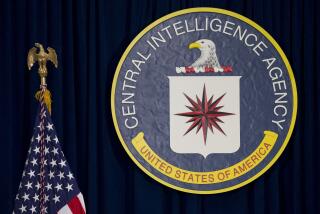The CIA Must Keep Its Vows of Openness
WASHINGTON — For anyone who likes to keep track of the CIA and its foibles, a wedding announcement a few months ago was a precious collector’s item.
The notice, which appeared in the Sunday society pages of the New York Times, said the bride was a great-great-granddaughter of Theodore Roosevelt. It then went on:
“Her grandfather, Kermit Roosevelt of Cockeysvile, Md., was an official of the Central Intelligence Agency who organized the 1953 counter-coup that put the Shah of Iran in power.”
What was interesting here was not the fact itself. Kermit Roosevelt’s role in organizing the overthrow of the Iranian government of Prime Minister Mohammed Mossadegh had been unearthed a long time ago. Indeed, Kermit Roosevelt had written about it in his memoirs.
Rather, what made this wedding announcement so remarkable was that the CIA has tried so hard for so long to obscure its involvement in the coup.
A few years ago, when the State Department published its official history of American policy toward Iran in the 1950s, it was forced to omit any mention of the CIA’s role because the agency wouldn’t turn over any information about it. The book, part of the supposedly authoritative series “Foreign Relations of the United States,” left readers with the false impression that the shah had come to power on his own.
And so we are left with this curious proposition: that information the CIA thinks might be too dangerous for the world to know is also safe enough to be published with pride on the society pages.
The Roosevelt wedding announcement came to mind because of a new lawsuit that is seeking to require the CIA to make public the records of some of its covert activities decades ago.
On May 13, the National Security Archive, a nonprofit organization based at George Washington University, went to court seeking to require the CIA to declassify records of a few of its covert intelligence operations, including those in Iran in the early 1950s. The suit seeks to have the records made public under the Freedom of Information Act.
The astonishing aspect of this lawsuit is that it merely asks for the CIA to stick to the commitments its own directors have made over the last decade.
The CIA goes through brief, occasional spasms of openness, whenever it believes its support in Congress or with the American public may be shaky. At such times, the agency likes to make splashy announcements to demonstrate how it is changing.
I was present at a congressional hearing in 1993 when then-CIA Director R. James Woolsey proclaimed that the CIA had decided to declassify the records of 10 major covert intelligence operations, all of them more than 30 years old. Woolsey’s predecessor, Robert M. Gates, had earlier said the CIA would open up some of these records, and Woolsey extended this assurance.
“To remain confident as we face the future, we must learn from our past, and that learning must be based on information that is both accurate and as comprehensive as possible,” Woolsey testified. He assured Congress that he would disclose these secret operations, “warts and all.”
His promise covered the CIA’s early covert activities in France and Italy, North Korea, Indonesia, Tibet, Laos, Iran, Guatemala, Cuba, the Dominican Republic and the Congo.
Since then, the CIA has slowly and quietly backtracked. It now says it can’t and won’t keep the commitment Woolsey made in Congress six years ago.
First, the CIA came up with what can be called the “Oliver Stone” excuse. In the wake of Stone’s movie “JFK,” which suggested the CIA was involved in a conspiracy to kill President Kennedy, Congress passed a law requiring declassification of documents relating to the Kennedy assassination.
The CIA said it was giving highest priority to complying with this law and therefore had to set aside for a time the work on declassifying its old Cold War operations.
More recently, the CIA has shifted ground. Last year, CIA Director George J. Tenet said his agency just didn’t have enough time or money to do all the work that it had earlier promised. Although some of the declassification work will go forward, he said, the CIA has decided not to open the files on its early operations in Iran, Tibet, Indonesia, France and Italy.
“We continue to face the dilemma of where to apply our available resources,” Tenet said. “The fact is, we do not have sufficient resources at the current time to review the documentation involved in these five remaining covert intelligence operations.”
The CIA has an annual budget of nearly $30 billion, enough to do what it wants. (We don’t know the exact budget figure, because the CIA, despite occasional suggestions it might change, won’t make this information public, either.)
It’s time for Congress and the courts to hold the CIA to its past promises of openness. Otherwise, we may be doomed to try to learn about its murky, distant past by reading the wedding announcements of the CIA’s grandchildren.
More to Read
Sign up for our Book Club newsletter
Get the latest news, events and more from the Los Angeles Times Book Club, and help us get L.A. reading and talking.
You may occasionally receive promotional content from the Los Angeles Times.










